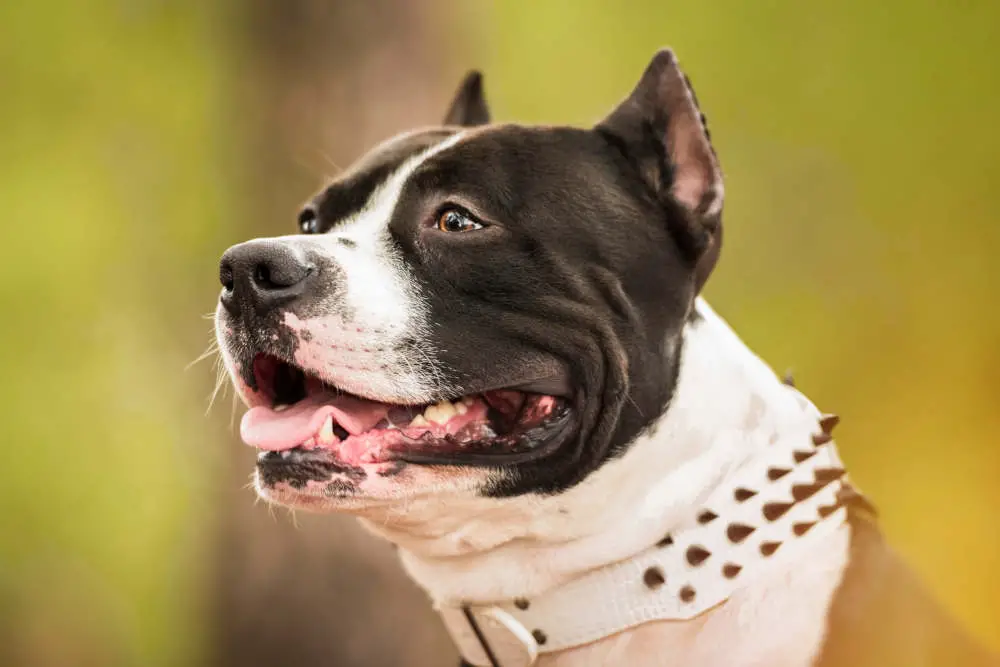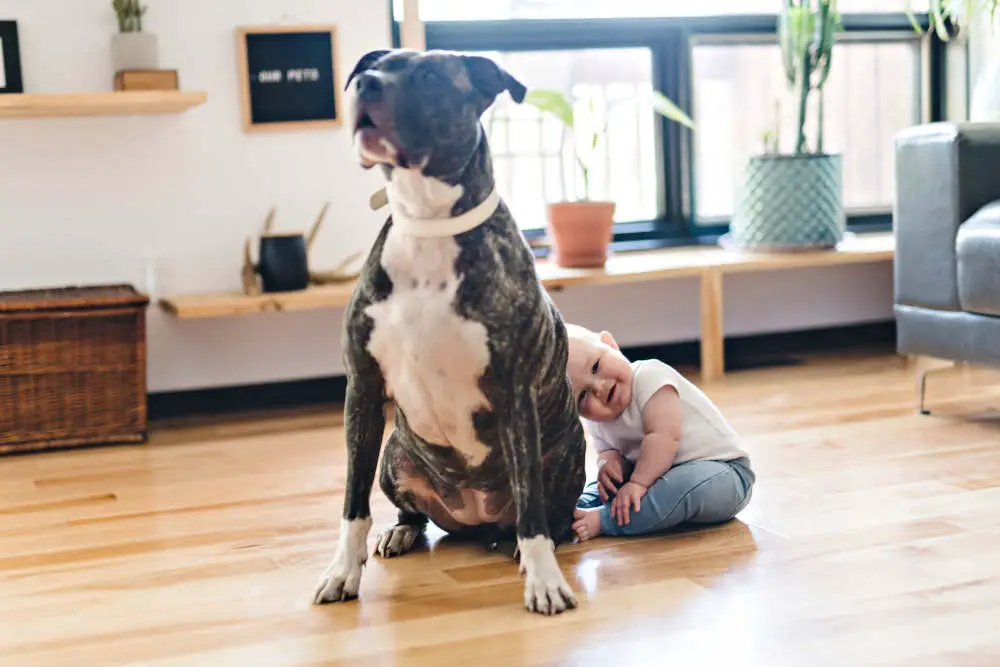
Colby pitbulls are a highly sought after breed of dogs due to their unique physical appearance and friendly temperament. These dogs are a hybrid of the American Pitbull Terrier and the Staffordshire Bull Terrier, and have a rich history that spans several centuries.
In this guide, we’ll take a comprehensive look at all aspects of the Colby pitbull, including their physical characteristics, temperament and behavior, health concerns, training and socialization needs, and history. Whether you’re considering adding a Colby pitbull to your family or just want to learn more about the breed, this guide has everything you need to know.
History of Colby Pitbulls
The history of the Colby pitbull can be traced back to the late 1800s in the United Kingdom. At the time, bull-baiting was a popular form of entertainment, and bulldogs were bred for their strength and tenacity.
When bull-baiting was banned in the UK, these dogs were then used for dog fighting, and breeders began to create crosses between bulldogs and terriers to produce dogs that were more agile and had a higher pain tolerance.
In the late 19th century, a man named John P. Colby began breeding American Pitbull Terriers in the United States, and these dogs quickly gained a reputation for their courage and fighting spirit.
Over time, the American Pitbull Terrier became the dominant breed in dog fighting circles, and the Colby line became one of the most well-known and respected bloodlines in the pitbull community.
Today, Colby pitbulls are no longer used for fighting and are instead recognized as a loyal and affectionate companion breed. While they may still have a reputation as a “tough” breed, the truth is that these dogs are friendly, playful, and make great family pets.
Physical Characteristics
The Colby pitbull is a medium-sized dog, with a muscular and athletic build. They typically weigh between 40 and 50 pounds, and stand 17 to 19 inches tall at the shoulder. This breed has a well-proportioned body, with a broad chest, muscular legs, and a strong, athletic build.
The breed has a short, shiny coat that comes in a variety of colors, including black, blue, brindle, fawn, and red. Some Colby pitbulls may have white markings on their chest, paws, or face, which add to their distinctive appearance. The coat is easy to care for and requires minimal grooming.
One of the most notable physical characteristics of Colby pitbulls is their muscular build. They have a broad chest and well-defined muscles that are well suited for athletic activities, such as weight pulling and agility. Despite their muscular build, Colby pitbulls are not heavy dogs, and they have a light, graceful gait. When walking or running, Colby pitbulls display a smooth, flowing motion that is both graceful and athletic.
In addition to their physical appearance, Colby pitbulls are also known for their friendly and expressive faces. They have a distinctive and charming smile, and their eyes are full of life and sparkle. Colby pitbulls are expressive dogs, and they are not shy about showing their emotions.
Temperament and Behavior
Intelligence and Trainability
Colby pitbulls are highly intelligent dogs that are eager to please their owners. This makes them easy to train, and they respond well to positive reinforcement techniques like praise and treats. They are quick learners and enjoy engaging in new tasks and activities. This combination of intelligence and trainability makes them ideal pets for first-time dog owners.
Friendliness and Affection
Colby pitbulls are known for their friendly and affectionate nature. They are social animals that enjoy the company of both people and other dogs. They are loyal and devoted to their owners and make excellent family pets. They are gentle with children and make great playmates. This affectionate nature is one of the things that makes the Colby pitbull so popular as a pet.
Energy and Playfulness
Colby pitbulls are high-energy dogs that require plenty of exercise and playtime. They have an athletic build and enjoy physical activities like running, jumping, and playing. They also have a playful nature and enjoy playing fetch and other games with their owners. Providing your Colby pitbull with plenty of exercise and playtime will help keep them happy and healthy.
Protective Instincts
While Colby pitbulls are generally friendly and affectionate, they also have strong protective instincts. They are naturally wary of strangers and may bark to alert their owners of potential danger. With proper socialization, however, Colby pitbulls can be trained to distinguish between threatening and non-threatening individuals.
Common Health Issues of Colby Pitbulls
Like all breeds, Colby pitbulls are susceptible to certain health issues. Some of the most common health concerns in this breed include:
- Hip dysplasia: This is a genetic condition that affects the hip joints and can lead to arthritis and pain.
- Elbow dysplasia: This is a similar condition to hip dysplasia, but it affects the elbow joints instead.
- Allergies: Colby pitbulls can suffer from allergies just like people can. Symptoms of allergies in dogs include itching, skin rashes, and digestive problems.
- Ear infections: Colby pitbulls have floppy ears, which can trap moisture and provide an ideal environment for bacteria to grow. This can lead to ear infections, which can be painful and uncomfortable for the dog.
Maintaining Your Colby Pitbull’s Health
The best way to keep your Colby pitbull healthy is to provide them with proper nutrition, exercise, and veterinary care. Feeding your dog a balanced diet that provides all the necessary nutrients will help keep their immune system strong and prevent health issues from developing. Regular exercise will help keep their muscles and joints healthy, and prevent obesity. Finally, taking your dog to the vet for regular check-ups and vaccinations will help keep them healthy and prevent disease.
Importance of Breeding
It’s important to choose a reputable breeder when buying a Colby pitbull. A responsible breeder will be able to provide you with a healthy, happy pup that has been bred with care. They will also be able to answer any questions you have about the breed, and provide you with information on how to care for your new pet.
In conclusion, while Colby pitbulls are generally healthy dogs, they are susceptible to certain health issues like hip dysplasia and ear infections. By providing your Colby pitbull with proper nutrition, exercise, and veterinary care, you can help keep them healthy and happy for many years to come.
Also Read: Gator Pitbull: A Look Into This Beloved Bloodline
Training
Training is an important part of owning a Colby pitbull. These dogs are intelligent and eager to please, which makes them relatively easy to train. However, like all breeds, they will respond best to positive reinforcement training methods, such as treats and praise. Consistency is key when training a Colby pitbull, as is starting training from a young age.
It’s important to remember that pitbulls, including Colby pitbulls, have a high energy level and a strong prey drive. This means that they will need plenty of physical and mental stimulation to stay happy and healthy. Training can provide this stimulation, and help prevent behavioral problems from developing.
Socialization

Socialization is another important aspect of owning a Colby pitbull. This breed is friendly and outgoing, but they can be wary of strangers and other animals if they haven’t been properly socialized. Socializing your Colby pitbull from a young age is key to preventing behavioral problems from developing later in life.
The best way to socialize a Colby pitbull is to expose them to a variety of people, animals, and environments. This will help them become well-rounded and confident dogs. Take your Colby pitbull to the park, the beach, and on walks in the neighborhood to help them become familiar with different sights, sounds, and smells. Introduce them to other dogs and people, and make sure they have positive experiences with everyone they meet.
Bottom Line
The Colby pitbull is a unique and charming breed of dog that has been a beloved companion for many generations. With their muscular build, short coat, and friendly disposition, Colby pitbulls are well suited for active families and make great pets.
Whether you’re looking for a loyal companion, an athletic partner, or simply a fun-loving friend, Colby pitbulls are sure to fit the bill. With proper training and socialization, they are friendly, affectionate, and obedient dogs that are always ready to play and have a good time.
So, if you’re considering adding a Colby pitbull to your family, be prepared for a lifetime of love and companionship. These dogs are truly special, and they are sure to bring a smile to your face every day!
FAQs
Are Colby Pitbulls rare?
Colby pitbulls are not considered to be a rare breed. However, they are not as commonly known or seen as other pitbull breeds, such as American pitbull terriers or Staffordshire bull terriers. Colby pitbulls have a dedicated following among pitbull enthusiasts, but they may be less well-known to the general public.
How long do Colby Pitbulls live?
On average, Colby Pitbulls live between 12-14 years. This is the same average lifespan as American Pit Bull Terriers as there is no indication that there is any difference in Colby Pitbulls.
How much exercise do Colby Pitbulls need daily?
Colby pitbulls require a moderate amount of exercise, and it’s recommended to give them at least 30-60 minutes of activity per day.
Is It easy to train Colby Pitbulls?
Yes, Colby pitbulls are highly trainable and respond well to positive reinforcement techniques.
How much does it cost to own a Colby Pitbull?
The cost of owning a Colby Pitbull can vary greatly depending on factors such as location, breeder, and the individual dog’s needs. On average, you can expect to spend anywhere from $500-$2,000 for a well-bred Colby pitbull puppy. This cost includes initial vaccinations, spaying or neutering, and any other necessary veterinary care. Additionally, you’ll need to factor in the cost of food, toys, grooming supplies, and any other expenses associated with pet ownership.

